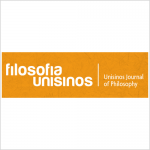Aristotle on pre-Platonic theories of sense-perception and knowledge
Vol 11, No 3 (2010) • Filosofia Unisinos - Unisinos Journal of Philosophy
Autor: Luis Andrés Bredlow
Resumo:
This paper is an attempt to make sense of Aristotle’s polemic –and, if taken at face value, quite evidently wrong– contention that the ancient thinkers globally failed to distinguish thought and knowledge from sensation. As I will try to show, what these thinkers missed, in Aristotle’s view, was his own concept of intellect (noûs) as a distinct mental faculty correlative to forms (eide). Lacking a concept of “forms” (formal and final causes), pre-Platonic thinkers, as Aristotle understands them, could conceive cognitive processes only as “alterations,” i.e. at a merely physical level of description, which made them unable to account for the difference between truth and error: by this failure, Aristotle argues in Met. ? 5, they unwittingly prepared the way for Protagorean relativism. This reconstruction will permit us also to have a more coherent understanding of some of Aristotle’s criticisms of Parmenides and Melissus; finally, I will shortly point out some analogies and differences between Aristotle’s theory of cognition and functionalist theories in contemporary philosophy of mind.
ISSN: ISSN: 1984-8234
Texto Completo: http://revistas.unisinos.br/index.php/filosofia/article/view/4648
Palavras-Chave: Aristotele,Presocratics,theory of knowledge,

Filosofia Unisinos - Unisinos Journal of Philosophy
The journal Filosofia Unisinos - Unisinos Journal of Philosophy is published once every four months by Universidade do Vale do Rio dos Sinos.
Articles must be original, unpublished, and not under consideration for publication anywhere else and can be written in Portuguese, English or Spanish
Filosofia Unisinos - Unisinos Journal of Philosophy prints articles, translations and critical book reviews. It also reprints papers that are considered fundamental to the area when authorized written permission is given by the original publisher.
